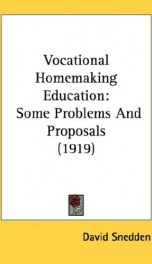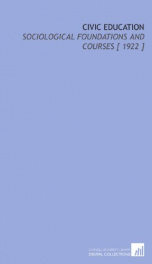educational sociology

Purchase of this book includes free trial access to www.million-books.com where you can read more than a million books for free. This is an OCR edition with typos. Excerpt from book: CHAPTER III WHAT IS EDUCATIONAL SOCIOLOGY?1 INTERPRETATIONS OF EXPERIENCE IT has previously been intimated that you, the reader, are something of a sociologist, in spite of your own doubts. But you are also something of an educatorall educated Americans in this democracy are that. At least, you have been greatly affected by schools, and you know that your home and your neighborhood community did much to educate you. Furthermore, you have a whole sheaf of opinions about educationthe education you had or did not have, and that which you know to be provided for others. You think that the time you spent on Latin was time wellor illspent; that for some of your friends a college education is a superfluous thing; that high-school education is getting "too practical"; that we do not give enough time to moral training; and so on indefinitely. You are apt to think of the purposes and consequences of education in terms of individual well-being. But that is chiefly because you think of social well-being as established by the sum-total of individual isell- bcinfjswhich is in large part true. But in time of war, or when you reflect on the political, moral, cultural, health or even economic needs of the cointnomi'calth, you easily come to see education in its larger social significance. All educators, but of course, conspicuously those who plan education, have always been forced to think of their purposes in terms of social well-being. Even when schools were for aristocrats only, they thought in terms of noblesse obligethe leaders idealized leadership for the sake of the common folk who must follow. You. too. have, half-consciously, always linked up educational aims and methods with your social knowledge. You can do it even more pur-g posively. These questions are submitted...
Info about the book
Author:
Series:
Unknown
ISBN:
1112250638
Rating:
4/5 (2)Your rating:
0/5
Languge:
English
Users who have this book
Users who want this book
What readers are saying
What do you think? Write your own comment on this book!
write a commentif you like educational sociology try:
Do you want to exchange books? It’s EASY!
Get registered and find other users who want to give their favourite books to good hands!





